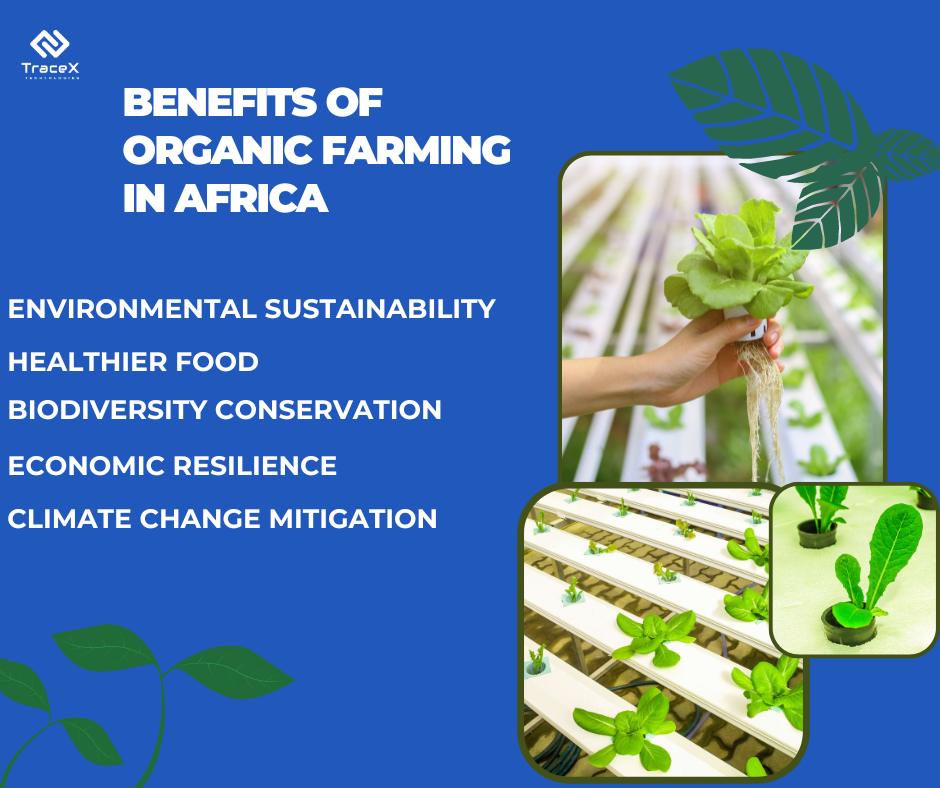Contact: +91 99725 24322 |
Menu
Menu
Quick summary: Explore the transformative potential of organic farming in Africa with our latest blog. Learn about sustainable practices, environmental benefits, and the socioeconomic impact of organic agriculture on the continent. Dive into the world of organic farming and its role in shaping the future of agriculture in Africa.

Across the sprawling savannas and fertile valleys of Africa, a movement is quietly gaining momentum – organic farming. Unlike the conventional agriculture often reliant on chemical fertilizers and pesticides, organic practices are revitalizing the land and empowering communities. Organic farming in Africa, transforms not just agricultural landscapes, but the continent’s food security and economic outlook.
Across numerous African nations, farmers are safeguarding their livelihoods by embracing organic food production. Through regional knowledge centres dedicated to organic agriculture, over four million farmers are gaining the necessary expertise to enhance crop yields while simultaneously preserving the environment.
Organic farming entails growing crops and rearing cattle without using synthetic fertilisers, pesticides, genetically modified organisms, or antibiotics. It emphasises ecological balance and sustainable measures such as crop rotation, composting, and natural pest control techniques. Organic farming seeks to protect soil health, biodiversity, and water quality while producing nutritious food.
Organic farming is extremely important and has enormous promise in Africa because of its ability to solve a variety of continent-wide concerns such as soil degradation, water scarcity, and food security. Organic farming approaches that promote agroecological principles can improve soil fertility, increase climate resilience, and conserve biodiversity. Furthermore, organic product demands higher prices in international markets, creating economic prospects for African farmers.
Examining various African nations reveals the promising potential of organic farming. For instance, in Togo, a project enabled soy farmers to adopt modern organic farming techniques, resulting in a nearly one-third increase in harvests. Nevertheless, the level of development within the organic sector across Africa varies significantly at both local and regional levels. While countries like Togo and Burkina Faso have been at the forefront of pioneering efforts for decades, others have taken longer to recognize the advantages of organic farming.
Apart from the one million hectares of certified organic agricultural land, an additional 16.4 million hectares are dedicated to organic beekeeping, forest, and wild collection areas across Africa. Farmers on the continent cultivate a wide array of organic crops, including cash crops like coffee, cocoa, tea, cotton, and olives, as well as processed fruits, vegetable oil, and various fresh produce such as fruits, vegetables, and honey. The majority of Africa’s certified organic produce is primarily intended for export markets, with a significant portion being shipped to the European Union, which stands as the largest market for agricultural produce from Africa.
Discover the differences between organic and conventional farming.
Learn about the benefits of organic practices, environmental impacts.
Organic farmers in Africa face several challenges that can hinder their success and sustainability:
1. Lack of Access to Resources: Many organic farmers struggle to access essential resources such as certified seeds, organic fertilizers, and pest management solutions, making it challenging to maintain organic practices effectively.
2. Limited Infrastructure: Inadequate infrastructure, including poor transportation networks and storage facilities, can lead to post-harvest losses and difficulties in reaching markets, reducing farmers’ profitability.
3. Climate Change Vulnerability: Organic farming is particularly susceptible to the impacts of climate change, including unpredictable weather patterns, droughts, floods, and pest outbreaks, which can negatively affect crop yields and livelihoods.
4. Certification Costs and Standards Compliance: Obtaining organic certification can be costly and time-consuming for farmers, especially smallholders with limited financial resources. Additionally, complying with stringent organic standards may require significant investments in training and infrastructure.
5. Market Access and Price Volatility: Accessing markets for organic products, both domestically and internationally, can be challenging due to competition, lack of market information, and price volatility. Additionally, organic products often command lower prices compared to conventionally grown counterparts, affecting farmers’ incomes.
6. Limited Research and Extension Services: Organic farming practices require specialized knowledge and skills, yet there is often a lack of research and extension services tailored to the needs of organic farmers in Africa, hindering their ability to adopt best practices and innovations.
7. Land Tenure and Policy Support: Insecure land tenure and inadequate policy support for organic agriculture can discourage investment and long-term commitment to organic farming practices among farmers and policymakers alike.
Addressing these challenges requires coordinated efforts from governments, NGOs, research institutions, and the private sector to provide tailored support, training, and resources to organic farmers in Africa.
Technology solutions play a crucial role in addressing the challenges faced by organic farmers in Africa by providing innovative tools and resources to enhance productivity, sustainability, and profitability. Here’s how technology solutions help:
1. Access to Information: Technology solutions, such as mobile applications and online platforms, provide farmers with access to valuable information on organic farming practices, weather forecasts, market prices, and pest management techniques, empowering them to make informed decisions.
2. Precision Agriculture: Precision agriculture technologies, including GPS-guided machinery, drones, and sensors, enable farmers to optimize resource use, monitor crop health, and detect pest infestations in real-time, resulting in improved yields and reduced environmental impact.
3. Market Linkages: Digital platforms and e-commerce solutions connect organic farmers directly with buyers, eliminating intermediaries and enabling farmers to access larger markets and secure better prices for their products.
4. Supply Chain Traceability: Blockchain and other traceability technologies provide transparency and accountability throughout the organic supply chain, ensuring the authenticity and integrity of organic products from farm to fork, which is crucial for gaining consumer trust and accessing premium markets.
5. Financial Inclusion: Mobile banking and digital payment solutions enable farmers to access financial services such as savings accounts, loans, and insurance, reducing their vulnerability to financial shocks and providing them with the capital needed to invest in organic farming practices.
6. Capacity Building: Online training courses, webinars, and virtual reality simulations facilitate capacity building and knowledge transfer among organic farmers, extension workers, and agricultural experts, enhancing their skills and understanding of organic farming principles and techniques.
7. Climate Resilience: Climate-smart technologies, such as drought-resistant crop varieties, soil moisture sensors, and weather forecasting tools, help organic farmers adapt to climate change impacts, mitigate risks, and maintain agricultural productivity under changing environmental conditions.
By leveraging technology solutions, organic farmers in Africa can overcome many of the challenges they face, improve their livelihoods, and contribute to sustainable agricultural development in the region.
Discover how innovative technology solutions can streamline operations, boost productivity, and drive sustainable growth for farmers across the continent
Unlock the power of farm management software tailored for Africa’s agricultural landscape!
TraceX blockchain traceability solutions empower organic farmers in Africa by providing a transparent and secure system to track their products throughout the supply chain. By leveraging blockchain technology, TraceX ensures the authenticity, integrity, and compliance of organic products, enabling farmers to meet certification standards and gain access to premium markets. This enhanced traceability not only builds trust among consumers but also allows farmers to command higher prices for their products. Additionally, TraceX promotes fair trade practices and sustainability initiatives, enabling farmers to showcase their commitment to ethical and sustainable farming practices. Overall, TraceX plays a crucial role in empowering organic farmers, enhancing market access, and promoting the growth of the organic farming sector in Africa.

Organic farming has a significant growth potential in Africa, driven by rising consumer demand for nutritious, sustainably produced food on a local and global scale. With enormous arable territory and a rich agricultural past, Africa has the potential to become a big participant in the organic farming business. African farmers that adopt organic practices can gain access to premium markets, fetch higher prices for their produce, and lessen their reliance on costly chemical inputs.
Emerging trends and opportunities in organic farming include the use of novel technology like precision agriculture and agroecology principles customised to local conditions. Agroforestry systems, for instance, offer various benefits such as better soil fertility, biodiversity conservation, and climate resilience. Furthermore, the advent of e-commerce platforms and digital tracking tools allows farmers to reach markets directly, avoiding traditional intermediaries and assuring more equitable pricing.
Finally, the future of organic farming in Africa looks promising. With rising consumer demand for nutritious, sustainably produced food, organic farming offers a feasible opportunity for African farmers to improve their incomes while also promoting environmental sustainability. The continent’s substantial agricultural resources and cultural preference for traditional farming practices lay the groundwork for the growth of organic agriculture. Furthermore, increasing trends such as the use of innovative technology and the integration of digital platforms provide up new opportunities for market access and efficiency. As Africa adopts organic agricultural practices, it will profit economically while also contributing to global efforts to improve food security, biodiversity protection, and climate resilience. Through strategic investments, policy support, and knowledge sharing, the organic farming sector in Africa can thrive, empowering farmers and fostering sustainable development for generations to come.
